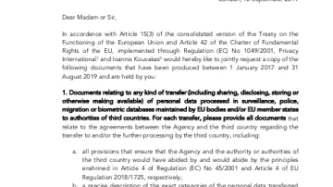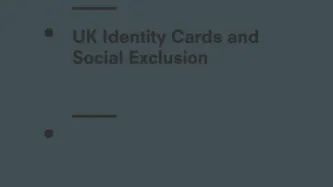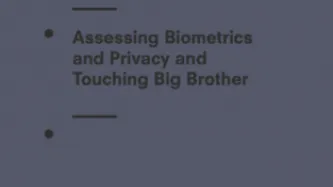Search
Content type: Case Study
This piece was written by Privacy International, based on publicly available information and on research by our partners at Hiperderecho
Overview
The Documento Nacional de Identidad (DNI) is the personal ID card recognised by the Peruvian State in any situation where a person might have to identify themselves, be it in an administrative, judicial, civil, or commercial context. The DNI also grants its holder the right to vote.
The DNI issuing and overseeing body is the Registro Nacional de…
Content type: Long Read
Introduction
In response to the unprecedented social, economic, and public health threats posed by the Covid-19 pandemic, the World Bank financed at least 232 "Covid-19 Response" projects. The projects were implemented across countries the World Bank classifies as middle and low-income.
This article will focus on eight (8) Covid-19 Response projects which sought to deliver social assistance to individuals and families on a "non-contributory" basis (this means that the intended beneficiaries…
Content type: Long Read
This report is available in English.
La mayoría de los documentos nacionales de identidad y demás documentos emitidos por autoridades estatales incluyen un marcador de género. Estos marcadores suelen recibir el nombre de “marcador de sexo” aunque este término no sea preciso. La presencia de dichos marcadores, especialmente en los certificados de nacimiento, promueve el énfasis de nuestra sociedad en el género como criterio de asignación de identidades, roles y responsabilidades sociales. Al…
Content type: Long Read
Este informe está disponible en español.
Most national ID or identifying documents include a gender marker. This is often known as a 'sex marker,' even though the term is inaccurate. The presence of such markers, especially on birth certificates, contribute to our society’s emphasis on gender as a criterion for assigning identities, roles and responsibilities within society. With gender being such a determining and dominant identifier, it puts it at the centre of so many arrays of our…
Content type: Report
In September 2019, Privacy International filed 10 access to documents requests to EU bodies regarding the transfer of surveillance capabilities to non-EU countries. The requests seek documents providing information on the transfer of personal data, surveillance technology, training, financing, and legislation to non-EU countries. The requests were submitted to:
Frontex
Europol
The European Union Agency for Law Enforcement Training
The Directorate-General for Economic and…
Content type: Long Read
Photo: Francesco Bellina
Driven by the need to never again allow organised mass murder of the type inflicted during the Second World War, the European Union has brought its citizens unprecedented levels of peace underpinned by fundamental rights and freedoms.
It plays an instrumental role in protecting people’s privacy around the world; its data protection regulation sets the bar globally, while its courts have been at the forefront of challenges to unlawful government surveillance…
Content type: Long Read
IMAGE SOURCE: "My Phone Bought This" by oliver t is licensed under CC BY-NC-ND 4.0.
LAST UPDATE: 16th May 2022.
Mandatory SIM card registration laws require people to provide personal information, including a valid ID or even their biometrics, as a condition for purchasing or activating a SIM card. Such a requirement allows the state to identify the owner of a SIM card and infer who is most likely making a call or sending a message at any given time.
SIM card…
Content type: Long Read
The Privacy International Network is celebrating Data Privacy Week, where we’ll be talking about how trends in surveillance and data exploitation are increasingly affecting our right to privacy. Join the conversation on Twitter using #dataprivacyweek.
It is often communities who are already the most marginalised who are at risk because of the privacy invasions of data-intensive systems. Across the globe, we see the dangers of identity systems; the harms of online violence against women and the…
Content type: Long Read
Photo credit: Francisco Javier Argel
Questions of identification and ID, with their associated privacy risks, are only increasing. There are multiple dimensions to understanding the impact of ID and identification; a key one is to understand how it can exclude. This is why Privacy International is conducting research to explore this important and underreported aspect.
Read our case studies: Carolina and Iliana.
In the identity discourse, identity is often closely linked to themes of “…
Content type: Long Read
Image attribution: By Legaleagle86 at en.wikipedia, CC BY-SA 3.0.
In a long-anticipated judgment, the Indian Supreme Court has ruled that India's controversial identification system Aadhaar is Constitutional. They based their conclusion on notes that there are sufficient measures in place to protect data, and that it is difficult to undertake surveillance of citizens on the basis of Aadhaar.
But there is some good in this ruling. The court has demanded that the Government introduce…
Content type: Long Read
Who are you? The Challenges of Identity and Identification
“Identity” is a word that covers an incredible range of contested, deeply personal and highly politicised questions. These range from the political and the sociological, through to the psychological and philosophical. A question such as “who are you?” can elicit a multiplicity of responses, none of which are straightforward, are sometimes highly contextual, and are often deeply contested.
However, there is something of an attempt to…
Content type: Long Read
The Sustainable Development Goals (SDGs) are the United Nations-led initiative to define the development agenda. Building on the eight Millennium Development Goals, the SDG’s 17 goals – and the 169 targets – serve as an opportunity to tackle many of the most pressing issues in the world today. The SDGs are also explicitly grounded in human rights. Goal 16 on “peace, justice, and sustainable institutions” aims to “Promote peaceful and inclusive societies for sustainable development, provide…
Content type: Long Read
Written by: Centre for Internet and Society
This guest piece was written by representatives of the Centre for Internet and Society (CIS). It does not necessarily reflect the views or position of Privacy International.
Introduction
As part of the State of the Surveillance project, CIS conducted a review of surveillance law, policy, projects, and trends in India. Below we provide a snap shot of key legal provisions governing surveillance in India and touch on…
Content type: Report
This report investigates the probable effect of the proposed UK national Identity Card system on people who are marginalised, who suffer social disadvantage or exclusion, and those who are disabled. The work focuses on the biometrics element of the government’s proposals (specifically facial recognition, ngerprinting and iris scanning).
The Report provides a specific assessment of the recently published biometrics trial conducted by the UK Passport Service (UKPS), and compares these…
Content type: Report
The evolution of information technology is likely to result in intimate interdependence between humans and technology. This fusion has been characterized in popular science fiction as chip implantation. It is, however, more likely to take the form of biometric identification using such technologies as fingerprints, hand geometry and retina scanning.
Some applications of biometric identification technology are now cost-effective, reliable, and highly accurate. As a result, biometric systems are…
Content type: Report
Proposals for identity (ID) cards have provoked public outrage and political division in several countries. In this paper Simon Davies analyses the key elements of public opposition to ID Card schemes, and profiles the massive 1987 Australian campaign against a national ID card.














